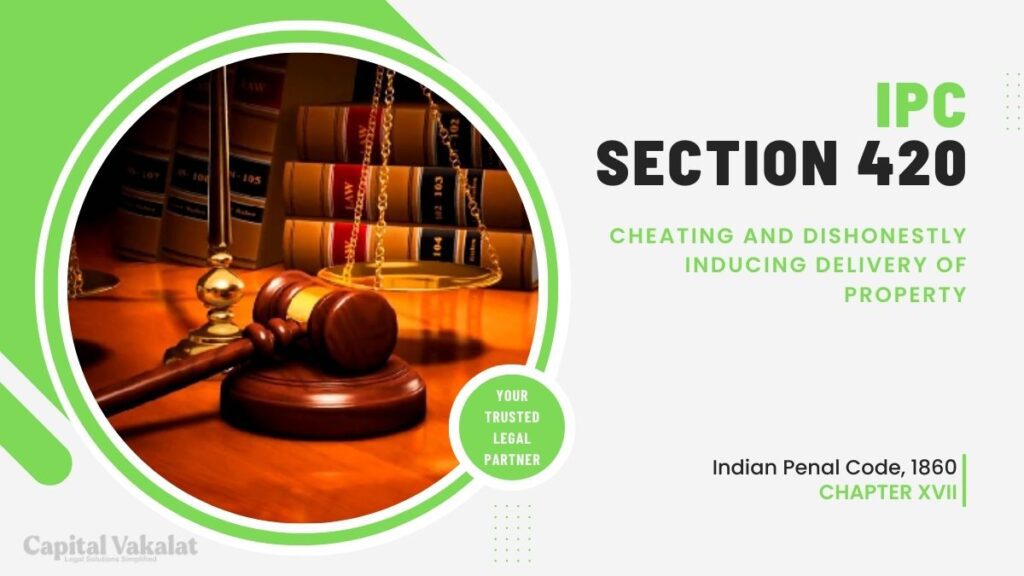Section 420 of the Indian Penal Code (IPC) deals with the offense of cheating and dishonestly inducing delivery of property. Understanding this legal provision is crucial for both citizens and legal professionals, as it addresses acts that involve deceit and fraud.

In this article, we will delve into the intricacies of Section 420 IPC, exploring its definition, historical context, legal consequences, real-life examples, prevention strategies, and more.
Understanding Section 420 IPC
Definition and Elements
Section 420 IPC defines cheating as a deliberate act of deception to induce someone to deliver property. The offense involves dishonesty and fraudulent intent, making it essential for the prosecution to establish these elements. Various actions, such as false promises, misrepresentations, and fraudulent schemes, can fall under the purview of Section 420.
Types of Actions Constituting Cheating
Cheating under Section 420 encompasses a wide range of activities. This includes but is not limited to financial scams, Ponzi schemes, and other fraudulent practices. The section is designed to address diverse situations where individuals exploit trust to gain property or financial advantage.
Historical Context
Origin and Evolution
Section 420 IPC has a rich historical background, evolving to address the changing dynamics of society. Originally drafted during the colonial era, its interpretation has been shaped by subsequent amendments and judicial decisions. Understanding its historical context provides insights into the legislative intent behind this provision.
Notable Cases
Several landmark cases have played a pivotal role in shaping the interpretation of Section 420 IPC. From high-profile financial frauds to complex Ponzi schemes, these cases have contributed to the legal understanding of cheating and its implications. Examining these cases helps in comprehending the real-world applications of the law.
Legal Consequences
Penalties for Conviction
Individuals convicted under Section 420 IPC face severe legal consequences. The penalties vary based on the gravity of the offense, including imprisonment and fines. Exploring these consequences underscores the gravity with which the legal system views cheating and dishonest inducement.
Role of Intent and Mens Rea
Establishing the accused’s intent and mens rea (guilty mind) is crucial in Section 420 cases. Legal proceedings hinge on proving the fraudulent intent behind the actions, emphasizing the importance of thorough investigation and evidence collection.
Real-life Examples
Famous Cases
Examining real-life examples of cases falling under Section 420 IPC provides practical insights into the complexities of cheating offenses. High-profile financial scams and corporate frauds have, at times, shocked the nation, leading to increased scrutiny and legal reforms.
Lessons Learned
Each case offers valuable lessons for both individuals and regulatory bodies. Understanding the modus operandi of fraudsters and the vulnerabilities exploited can contribute to improved preventive measures and legal frameworks.
Prevention and Awareness
Tips for Individuals
Protecting oneself from falling victim to cheating requires awareness and vigilance. Simple yet effective tips, such as verifying credentials and conducting due diligence, can go a long way in preventing fraudulent schemes.
Importance of Public Awareness Campaigns
Public awareness campaigns play a pivotal role in preventing cheating offenses. Educating the public about common scams and frauds empowers individuals to make informed decisions, fostering a more vigilant and resilient society.
Challenges in Prosecution
Difficulty in Proving Cases
Prosecuting individuals under Section 420 often faces challenges, including the need for substantial evidence and the complexity of financial transactions. Addressing these challenges requires legal reforms aimed at streamlining investigation and prosecution processes.
Need for Legal Reforms
Recognizing the hurdles in prosecuting cheating cases, there is a growing call for legal reforms. Adapting laws to the evolving nature of fraud, especially in the digital age, is essential for an effective and just legal system.
Landmark Judgments
Analyzing Court Decisions
Landmark judgments related to Section 420 IPC have shaped legal precedents and influenced subsequent cases. Analyzing these decisions provides a deeper understanding of the legal principles applied by the judiciary in cheating cases.
Impact on Legal Precedents
The decisions rendered by courts in Section 420 cases have a lasting impact on legal precedents. They contribute to the development of jurisprudence, guiding future legal interpretations and ensuring consistency in legal outcomes.
Relevance in the Digital Age
Adapting to Contemporary Challenges
The advent of the digital age has brought new dimensions to cheating offenses. Cybercrimes and online frauds pose unique challenges that necessitate adaptations to existing legal frameworks. Section 420 IPC must be responsive to these contemporary challenges to remain effective.
Cybercrimes and Cheating in the Digital Realm
Examining how Section 420 applies to cybercrimes provides insights into the legal dynamics of online fraud. The intersection of technology and criminal intent requires a nuanced approach to ensure justice in the digital realm.
Conclusion
In conclusion, Section 420 IPC plays a vital role in addressing cheating and dishonest inducement, reflecting society’s commitment to justice and fair dealings. The historical evolution, legal consequences, real-life examples, prevention strategies, and challenges in prosecution all contribute to the multifaceted nature of this legal provision. As we navigate the complexities of the digital age, ongoing awareness, legal reforms, and a proactive approach remain crucial in upholding the integrity of Section 420 IPC.
Frequently Asked Questions
What are the penalties for a Section 420 conviction?
Penalties include imprisonment and fines, varying based on the gravity of the offense.
How can individuals protect themselves from cheating?
Individuals can protect themselves by verifying credentials, conducting due diligence, and staying informed about common scams.
What challenges exist in prosecuting Section 420 cases?
Challenges include the need for substantial evidence and the complexity of financial transactions.
How has Section 420 evolved in response to the digital age?
Section 420 IPC is adapting to contemporary challenges, including cybercrimes and online frauds, through legal reforms and nuanced interpretations.